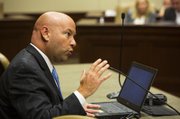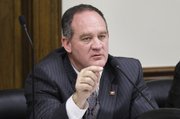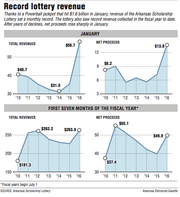Fueled by a world-record $1.6 billion Powerball jackpot, Arkansas' lottery generated more revenue and net proceeds in January than it had in any month since ticket sales started in September 2009.
The increased revenue, however, won't result in any changes in the college scholarship program for now, officials said. Any changes require legislative approval.
The Arkansas Scholarship Lottery reported $58.7 million in total revenue in January, resulting in $13.8 million in net proceeds, which go to scholarships.
The January revenue included $31.2 million in scratch-off tickets; $27.4 million in draw-game tickets, which include the Powerball and Mega Millions and a handful of other games; and more than $55,000 in retailer fees, the lottery said Wednesday in its monthly report to the Legislative Council's Lottery Oversight Subcommittee and Gov. Asa Hutchinson. Of the draw-game tickets, Powerball sales totaled $22.9 million, the state said.
Lottery Director Bishop Woosley said January revenue eclipsed the previous monthly record of $51.5 million in March 2012 and January's net proceeds of $13.8 million exceeded the previous record of $12.8 million in March 2012. The March 2012 ticket sales were fueled by a record Mega Millions jackpot of $656 million in that month.
Woosley said the record Powerball jackpot drove ticket sales significantly in January and was the primary cause for increased total revenue and net proceeds.
Scratch-off sales "also had a very strong month, the best since January 2010," he said a written statement. Powerball sales may have affected scratch-off sales, but they "were in line with increases we've seen over the previous six months."
"I'm pleased with the improved results from the lottery," Hutchinson said in a written statement. "It's clearly on a stronger financial path, but it's certainly too soon to make any changes or adjustments until we have a longer record of experience with increased revenues."
Along with $20 million a year in state general revenue and a $20 million reserve fund used to cover temporary scholarship funding shortfalls, the lottery has helped fund Arkansas Academic Challenge Scholarships for more than 30,000 students during each of the past six fiscal years.
The Legislature has cut the size of the scholarships for some future recipients three times, partly because the lottery's net proceeds fell short of initial projections.
Net proceeds -- the amount raised for scholarships -- collected in an entire year peaked in fiscal 2012 at $97.5 million before dipping each of the past three fiscal years.
During the first seven months of fiscal 2016, the lottery's total revenue of $263.9 million is the largest amount raised during the first seven months of a fiscal year.
The previous record was $262.2 million during the first seven months of fiscal 2012.
During the first seven months of fiscal 2016, net proceeds totaled $49.9 million. That's the most since $51.2 million was raised during the same July-January period in fiscal 2012, but still shy of the record $55.1 million raised in the same period of fiscal 2011.
The lottery also reported an unclaimed-prize balance of $4 million on Jan. 31.
Act 1180 of 2011 requires that unclaimed money, minus $1 million, be transferred to the state Department of Higher Education's scholarship account on the last day of each fiscal year.
Woosley, who has been director since February 2012, has projected that lottery revenue will be $411 million and net proceeds for college scholarships will be $79.5 million in fiscal 2016 -- up from $409.2 million in revenue and net proceeds of $72.4 million in fiscal 2015.
Woosley said he has no plans to change his forecast.
"At this point, we are over $8 million ahead of budget" in what was expected in net proceeds, he said. "We are hopeful that this trend continues and that we continue to meet budget for the rest of the fiscal year."
The lottery is experiencing the resurgence nearly a year after the 2015 Legislature implemented new eligibility requirements for the scholarships and reduced scholarship amounts for freshmen.
Act 1105 of 2015, sponsored by Sen. Jimmy Hickey, R-Texarkana, requires high school graduates to have ACT scores of at least 19 or the equivalent on comparable college entrance exams to be eligible for a scholarship. The new requirement applies to future high school graduating classes, starting with the class of 2016, according to the department's website.
High school graduates previously were required to have completed the Smart Core curriculum and achieved either a high school grade-point average of at least 2.5 or a minimum score of 19 on the ACT or its equivalent.
Under Act 1105, the scholarship size for future recipients will be reduced from $2,000 to $1,000 for the freshman year at two- and four-year colleges.
The scholarships will increase from $3,000 to $4,000 for the sophomore year at four-year colleges and from $2,000 to $3,000 for the sophomore year at two-year colleges.
Scholarship recipients will receive $4,000 as juniors and $5,000 as seniors at the four-year colleges.
The changes are aimed at providing an incentive for students to remain in college and helping make sure there is enough funding for scholarships, according to supporters of the law. Critics of the law argue the changes will hurt the poor and minority-group students.
Hickey said Wednesday that he favors using these scholarship amounts "as a base [level] and having the Legislature allocate "any excess" money collected in a fiscal year to increase scholarship sizes during the first or second year of college or increase the allocation to nontraditional students.
Then the Legislature would empower the state Department of Higher Education to adjust the scholarship amounts each year under his plan, he said.
"We can manage this thing, so we don't get into a financial bind we have been in," Hickey said.
The increased revenue and net proceeds for scholarships also come nearly a year after Hutchinson signed legislation on Feb. 26, 2015 to place the lottery under the control of the state Department of Finance and Administration and eliminate the nine-member Lottery Commission that oversaw its operations.
The Hutchinson administration has hired Camelot Global Services to produce a business plan for the lottery by a March 8 deadline under the terms of its consulting contract. The firm has offices in London and Philadelphia.
Under the contract, the consulting firm will receive base compensation and expense reimbursements up to $750,000 a year, but it also will be eligible for incentive compensation of at least 12.5 percent of the lottery's adjusted operating income above $72.28 million in a fiscal year.
The contract also calls for Camelot to help the lottery implement the business plan and renegotiate contracts with vendors; the savings would be used to help pay for Camelot's services. The contract runs through June 30, 2020, with options for two one-year extensions.
Former Lt. Gov. Bill Halter, a Democrat from North Little Rock who led the campaign to persuade voters in 2008 to approve Amendment 87 to authorize the General Assembly to create the lottery, projected the lottery would raise about $100 million a year for college scholarships.
The finance department projected several years ago that the lottery would raise roughly $55 million a year for scholarships.
A Section on 02/11/2016



